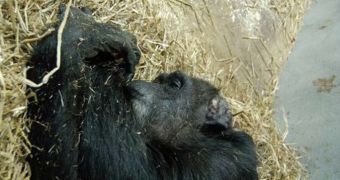Instances in which chimpanzees die naturally have been little-studied over the years, due to their rarity. As such, researchers had very few clues as to how others in a group behave when one of the members dies. But investigators had the chance to look at one such instance more closely in 2008, when a chimp in a Scottish safari park died peacefully, aged 50. The science team that surveyed her final hours determined that fellow chimps may have a higher awareness of life and death than initially thought.
In some groups in the wild, the members may gather around a dying chimp, to watch as he or she goes to rest. In a number of instances, researchers noticed that some mothers tend to carry the mummified remains of their offspring for weeks on end, before finally renouncing them. This suggests that the primates have a deeper understanding of the absence of life than we first thought they did. Analyzing Pansy's death (the chimp in Scotland) was like a breath of fresh air for this field, and provided even more insight into the animals' behavior, LiveScience reports.
The researchers noticed that all group members around Pansy tended to go about their daily business in a quiet manner, and made less noise than usual. During the nights, they went to sleep closer to the dying chimp. Just before the animal peacefully went to sleep, a number of other chimps groomed her, and exhibited affectionate behavior. One of the males appeared to have tested her for signs of life during her agony, interested in signs of breathing and motions of the limbs.
“When the adult male behaved as though he was testing Pansy for signs of life, it struck home that the chimpanzees might indeed have greater awareness of the difference between life and absence of life than we previously thought. Several phenomena have at one time or another been considered as setting humans apart from other species – reasoning ability, language ability, tool use, cultural variation, and self-awareness, for example, but science has provided strong evidence that the boundaries between us and other species are nowhere near to being as clearly defined as many people used to think. The awareness of death is another such psychological phenomenon,”explains University of Stirling primatologist researcher James Anderson.
After Pansy died, the group removed straws from her fur, and then remained silent for days, eating less and making less noise than usual. The spot where she died was also avoided for the next days, even though many of the chimps preferred sleeping there. “In general, we found several similarities between the chimpanzees' behavior toward the dying female, and their behavior after her death, and some reactions of humans when faced with the demise of an elderly group member or relative, even though chimpanzees do not have religious beliefs or rituals surrounding death,” Anderson concludes.

 14 DAY TRIAL //
14 DAY TRIAL //